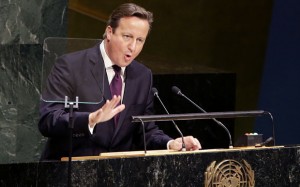UNITED NATIONS — The specter and shadow of international terrorism tragically clouded the opening of the UN General Assembly session, yet again. The growing menace from ISIS/ISIL jihadi terrorists threatening the sovereignty of Iraq and Syria goes beyond the Middle East and now extends to possible terror strikes in Western Europe and the United States.
In the past few years Americans were reassured by the Administration that Al Qaida and its offshoots were largely defeated. This assertion by President Obama in the wake of the killing of terror kingpin Osama bin-Laden was challenged by the attacks on the American consulate in Benghazi, Libya. Subsequent reality has proven that Al Qaida and its offshoots have dangerously expanded.

Events in Algeria, Iraq, Mali, Nigeria, Syria, and Somalia, reaffirm this.
The Administration’s singular foreign policy achievement was touted as the military withdrawal from Iraq. While Washington should have pressed for a small residual U.S. force in the country, both an ineffective and venal government in Baghdad and a lack of vision by the U.S. Administration, allowed a total withdrawal in 2011. We are paying the price for indifference during the end game in Iraq.
At the onset of his speech to the UN General Assembly, President Barack Obama admitted candidly, “We come together at a crossroads between war and peace; between disorder and integration; between fear and hope.” In a sweeping address against global terrorism, he warned “The terrorist group known as ISIL must be degraded, and ultimately destroyed.” U.S. airstrikes are focused on that mission.
He spoke of the “cancer” of “extremism” in the Islamic world and ISIS’s “network of death,” as among the reasons America is forming a military coalition to fight it.
Significantly the U.S. convened a high level meeting of the Security Council to deal with the growing threat from foreign fighters going to Syria.
Up to 15,000 foreigners, many of them Western have joined hardline jihadi groups in Syria to combat the Assad regime. These fighters from 80 countries include over 2,000 Europeans and 100 Americans. The European Union’s anti-terror chief says the number of Europeans militants may be as high as 3,000.
As this column has oft stated, Syria’s civil war has become the “cause” for global Islamic militants, not just from the Middle East but for Europe and the USA as well. The International Brigades in Syria evoke the Spanish civil war of the 1930’s, insofar as it’s a rallying point for extremists not just from Pakistan but the suburbs of Paris, London and Hamburg. And yes, there are militants from Florida and Minnesota too.
Importantly, the Security Council unanimously passed an eight-page resolution which tightens the noose on travel, transport, financial support for these foreign fighters. Yet as Obama concedes, “Promises on paper will not keep us safe.” He’s right.
The President stated bluntly, “the only language understood by killers like this is the language of force.” He sounds like his predecessor.
Secretary General Ban Ki-moon told assembled Presidents and Prime Ministers, “The growing phenomenon of foreign terrorist fighters is a consequence, not a cause, of the conflict in Syria.” He added, “A long period of upheaval and until recently, unresponsive leadership in Iraq, coupled with outrageous human rights abuses in Syria, have created a hothouse of horrors.”
More than 200,000 people have died in the Syrian conflict thus far.
Yet as Ban added, “eliminating terrorism requires international solidarity and a multifaceted approach.” He stressed, “Missiles may kill terrorists. But good governance kills terrorism.”
The Secretary General advised, “Free and independent societies, free from suffering, oppression and occupation, this is what will kill terrorism.”
British Prime Minister David Cameron concurred, “Everywhere there is conflict, everywhere there is poor governance, the poisonous narrative of Islamic extremism has taken hold.”
Two years ago at the UN, the President was addressing the aftermath of the Benghazi attack, a bloody debacle. Last year, we were on the brink of airstrikes on Syria after the regime allegedly used chemical weapons. Today we face the hydra-headed Islamic State blitz across Syria and Iraq.
Indeed, the anti-terrorism rhetoric is often outstanding. But shall there be the sustained political will and coherent military strategy to follow up? Does America really understand this is a war of a generation, (since 2001) not just an impressive shock and awe TV images destroying jihadi militants with computer game precision?
While Washington seeks to build a global coalition to fight the militants, and hit the terrorists through lethal airpower, are we prepared for the wider and unforeseen consequences of yet another Mid East conflict?
John J. Metzler is a U.N. correspondent covering diplomatic and defense issues. He writes weekly for WorldTribune.com. He is the author of “Divided Dynamism The Diplomacy of Separated Nations; Germany; Korea, China”, 2014)


You must be logged in to post a comment Login